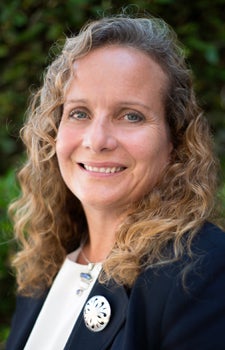Heidelberg Steers the Ship
As director of the USC Dornsife Environmental Studies Program, Karla Heidelberg plans to develop new opportunities for students to gain real-world experience through hands-on internships and training with corporations, researchers and other local partners.
These offerings will give students the broad skills to go into the world and generate creative-yet-practicable solutions to society’s most pressing environmental challenges.
“As we move forward, our educational programs need to consider that the solutions that were appropriate in the past may not be best for the problems of tomorrow,” Heidelberg said. “To borrow a metaphor from sailing, we cannot steer a ship by looking in the rearview mirror.”
In addition to traditional campus-based courses, the Environmental Studies Program offers opportunities for students to study abroad on Catalina Island and in Guam, Palau, Belize and New Zealand.
“It’s critically important for students to appreciate environmental issues on local, national and international levels, and from the viewpoint of developing nations as well as developed nations,” Heidelberg said.

Focusing on the genomics and metabolism of microbes in coastal oceans, Karla Heidelberg’s research also examines life in extreme environments such as Antarctica. Photo by Peter Zhaoyu Zhou.
Heidelberg in August joined the program at the USC Wrigley Institute for Environmental Studies, housed in USC Dornsife. The interdisciplinary program trains undergraduate and masters students to address the complex nature of environmental problems.
“It’s our challenge to prepare professionals who can cross disciplines and address global issues,” Heidelberg said.
Heidelberg holds a Ph.D. in Marine-Estuarine and Environmental Science and Biological Oceanography from the University of Maryland, College Park. Heidelberg, associate professor (teaching) of biological sciences, was a resident faculty member at the Wrigley Marine Science Center on Catalina Island from 2006-2014.
Heidelberg’s research at USC Dornsife has focused on the genomics and metabolism of microbes in coastal oceans. She also studies life in extreme environments such as Antarctica, hypersaline lakes in Australia and hydrothermal vent systems on the ocean floor. Her teaching courses span biology, marine biology, ecology, and oceanography, and she has received several University awards including the Steven B. Sample Teaching and Mentoring Award for 2012-2013.
In addition to Heidelberg’s research and teaching accomplishments, she has worked with the National Science Foundation to define training in science and technology, engineering and math (STEM) disciplines for the next generation. Through those efforts, she is exploring new ideas for strengthening STEM programs at USC.
“I want our students to have a strong understanding and appreciation of the natural world from physical, biological and chemical perspectives,” she said. “I also want them to have a general understanding of environmental studies that’s informed by scholarly insights from both the natural and social sciences.”